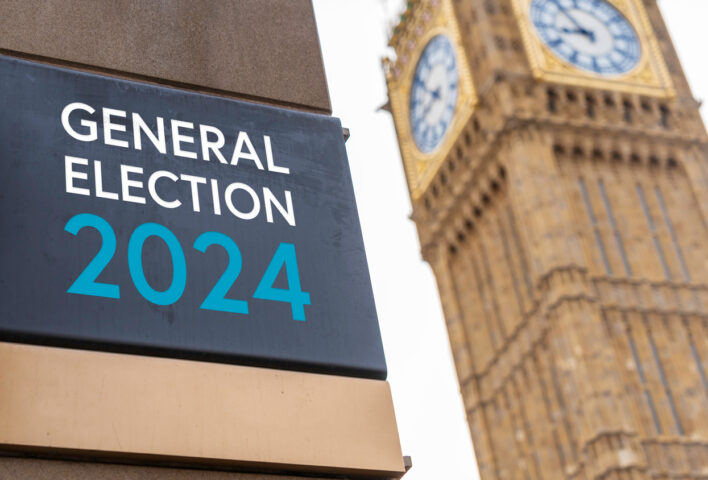The election dust settles… now the real work begins!
Following the historic events in the world of UK politics over the last week, Richard McIlwain, Chief Executive of the Vegetarian Society, shares his thoughts on what we might expect from the new government, and what it can expect from the Vegetarian Society…

N.B. As a campaigning charity with a rich policy work programme, the Vegetarian Society holds no party affiliation. However, we are determined in our campaigning for animal welfare, the sustainable food agenda, the climate, and the provision of vegetarian and vegan choices for the public.
Following the UK Parliamentary elections on 4th July, the dust has now settled and already Parliament is sitting with a slew of new faces all trying to navigate the corridors of Westminster. The Labour Party secured a thumping victory, having won 411 of the 650 available seats, providing a majority of 171 and a working majority of 182 (when non-voting seats such as the speaker and Sinn Fein are taken into account).
Now, depending on your political affiliation, a change of government can be an exciting time, a chance for new policies and new thinking to emerge. So, what might the next couple of years bring from the Vegetarian Society’s perspective?
Of course, it’s early days and so the overall answer is ‘time will tell’.
If you read my pre-election blog (or indeed the Labour Party manifesto), you’ll know it was light on detail when it came to agriculture and food. Indeed, the Liberal Democrats and the Green Party had the most progressive policy ideas, including plans for meat reduction, support for horticulture and better animal welfare (although as the Vegetarian Society, we firmly believe that the best form of animal welfare is to stop eating them…).
But with a substantial working majority, there is little need for the Labour frontbench to co-operate with other parties, and so we are unlikely to see olive branches offered to either the Liberal Democrats or Greens.
But there are opportunities. The Labour manifesto did contain a broad commitment to champion British farming while protecting the environment. It did promise to bring forward a new ‘Land Use Framework’ making it work for farmers and nature. It did set a target for half of all food purchased across the public sector to be locally produced or certified to higher environmental standards (although this is itself a reiteration of the recent Public Sector Procurement Act.) And, of course, it has committed to net-zero by 2050, and while there is (rightly) a primary focus on energy production with the announcement of a new ‘Sovereign Wealth Fund’ to pump-prime private investment into green energy, the food system and farming cannot be far behind.
At Defra, Steve Reed MP retains his shadow brief and is now Secretary of State for Environment, Food and Rural Affairs, revealing his top priorities as: cleaning up rivers, lakes and seas; creating a roadmap to move Britain to a zero-waste economy; boosting food security; and ensuring nature’s recovery while protecting communities from the dangers of flooding. The issue of ‘food security’ is multi-layered and gives us a great opportunity to influence policy, particularly incentivising the growing and consumption of more fruit, vegetables and other plant-based foods. At the time of writing, it also looks as if Daniel Zeichner will be Minister for Agriculture – a brief he is also familiar with from the shadow Labour frontbench, providing continuity and some knowledge of the issues at the top of Defra, which can only be a good thing.
And, likewise, Wes Streeting MP retains his previous shadow role, now as Secretary of State for Health and Social Care, while Karin Smyth MP for Bristol South, a former NHS organisation manager, has been appointed as a Minister of State for Health at the Department of Health and Social Care (DHSC). The Labour manifesto was vocal on the need to ban advertising of high fat, salt and sugar products to under 16s, which perhaps demonstrates that the government will not be afraid to be interventionist where needed. And already Wes Streeting has outlined his three main policies for his department which include cutting waiting times and improving public health, developing the UK’s life science and medical technology industries while using the institutions of the NHS to spur economic growth through training and jobs. But again, there is a clear opening for the Vegetarian Society to influence health policy on diet, given the focus on improving public health – with a well-planned diet being a key foundation of good health (and, of course, a well-planned vegetarian or vegan diet provides better health outcomes, as evidenced by numerous studies).
And so, while the Labour manifesto may have been light on policy when it comes to food and agriculture, there remains plenty to play for and the Vegetarian Society will increasingly seek to make its voice heard within Westminster, beginning with a parliamentary event later this year. Of which, more news shortly – watch this space…!
